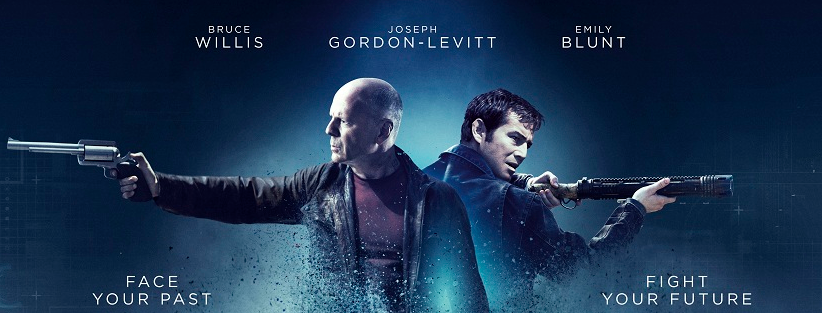Before I get myself dizzy, a brief synopsis: The year is 2044. Joe (Joseph Gordon-Levitt, our capable, oddly fashion-conscious hero) works as a "Looper" for the mob, an organization operating 30 years in the future. When it's time to do away with an undesirable, the mob sends their victim back in time, where the Looper waits to slay the hapless time-traveler at the exact second of his or her arrival. It's highly illegal, and thus—according to every film ever made—highly lucrative...but it comes with a catch. To keep business operations tidy, the mob will sometimes kill off their own Loopers by sending them back to their younger selves. In a poetic twist, these twentysomething hired hands often wind up their own killers.
Early on, we see all sorts of potentially intriguing narratives and juxtapositions. Loopers live large, sporting speedy rides and spacious flats, while the general public wanders the streets in tattered clothing, too poor to afford anything better. Young Loopers celebrate recklessly; their older, retired counterparts view the world wearily. They've finally discovered they made the wrong choices, but still don't know which ones were right.
And then, as though sensing the uncomfortably profound tenor of the film, Bruce Willis barrels onto screen and promptly mows down every last compelling strand. I don't fault Willis (playing Joe, 30 years later): he has nothing to work with in a role devoid of nuance. Looper should have tapped the thoughtful, conflicted Willis from The Sixth Sense, not the guns-blazing man-robot from Die Hard. Gradually at first, then more and more rapidly, Looper becomes a made-for-TV movie, with cheap tricks, bad child actors (sorry, Pierce Gagnon), and laughably unnecessary action sequences (why does Willis have to shoot up a whole facility?).
Worst of all, however, is Looper's irresponsible treatment of time travel. After years of cinema, I've identified the two—and only two—acceptable approaches to time manipulation. The first holds that only one version of time exists. As such, no one can change the past: when individuals return to years gone by, they can only fulfill the destiny of what already happened. They may do so unknowingly, but time is sensibly linear…things happen the way they happen, and that's that. Harry Potter and the Prisoner of Azkaban executes this about as well as any recent popular fiction. The second, riskier logic requires a central character who comes upon the opportunity to change the past. When she does so, reality alters on the spot (ideally, signified by a loud, grating noise or visual disruption), and only she and the viewer remember the old (and now, nonexistent) version of what happened. Examples include Frequency and The Butterfly Effect.
Looper does neither. Instead, it hopes viewers will simply accept its lazy, disengaged, inconsistent presentation of traveling through time. To be fair, the film does seem sheepishly aware of this shortcoming, attempting to patch it over as Gordon-Levitt and Willis sit together in a diner, comparing notes. Young Joe (Levitt) asks Old Joe (Willis) whether his present-day actions will change Old Joe's memories. "It doesn't matter!!" screams Old Joe, a little too quickly and forcefully. It's as if he's Looper's producer, on a strict deadline to see the film released before the late fall line-up of Oscar favorites. "I don't want to talk about time travel shit!" It is, perhaps, the most honest line in the film.
What a pity. I loved Looper's realization of a futuristic world not too far ahead, with memorable weaponry (the clumsy "blunderbuss," the elegant "gat revolver") and clever technological advances (the hover-speed-bikes, the part-hologram-part-tablet computers). Successful entrepreneurs often say that good ideas are cheap and execution is everything. If only Looper knew.


 RSS Feed
RSS Feed
